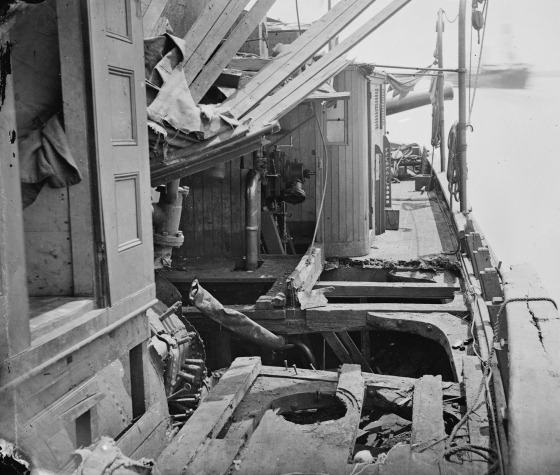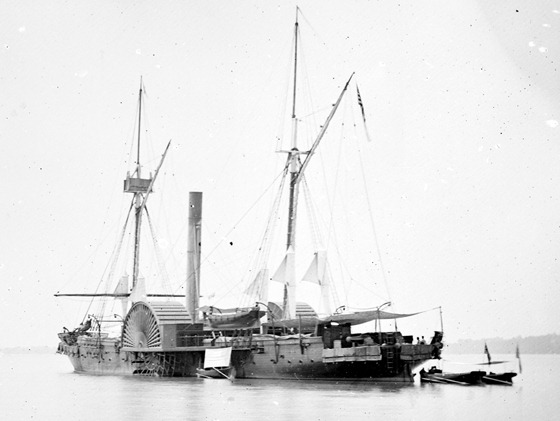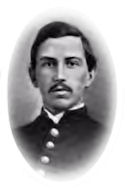Camp near James River,
July 4, 1862.
Dear Friends at Home:—
I sent a few words to you yesterday just to relieve your suspense, and to-day I will write a little more, though, in the present condition of my mind and body, worn out by fatigue and exposure, you cannot expect much but a disconnected letter. The papers will have told you of the strategic movement of McClellan’s army, its causes and its complete success. All that remains for me to write, and all that I can be expected to know is where the Eighty-third went and what it did. The fight on the right began on Thursday, the 26th of June, and we took all on our backs and went out that afternoon but did no fighting. Friday morning at daylight we fell back to a position on a stream near Gaines’ Mill. The rebels soon followed, feeling their way along, and at about 2 o’clock the fighting became general along the whole line. Our brigade formed the left flank of the line and lay nearest the river. The Eighty-third was posted in a deep gully, wooded, and with the stream I mentioned running in front of us. We built a little breastwork of logs and had a good position. On the hill behind us the Forty-fourth and Twelfth New York and the Sixteenth Michigan were posted. When the rebels made the first attack, we could not fire a shot, the hill concealing them from us, and so we lay still while the bullets of two opposing lines whistled over our heads. They were repulsed, but only to pour in new troops with greater vigor than before. Suddenly I saw two men on the bank in front of us gesticulating violently and pointing to our rear, but the roar of battle drowned their voices. The order was given to face about. We did so and tried to form in line, but while the line was forming, a bullet laid low the head, the stay, the trust of our regiment—our brave colonel, and before we knew what had happened the major shared his fate. We were then without a field officer, but the boys bore up bravely. They rallied round the flag and we advanced up the hill to find ourselves alone. It appears that the enemy broke through our lines off on our right, and word was sent to us on the left to fall back. Those in the rear of us received the order but the aide sent to us was shot before he reached us and so we got no orders. Henry and Denison were shot about the same time as the colonel. I left them together under a tree. I returned to the fight, and our boys were dropping on all sides of me. I was blazing away at the rascals not ten rods off when a ball struck my gun just above the lower band as I was capping it, and cut it in two. The ball flew in pieces and part went by my head to the right and three pieces struck just below my left collar bone. The deepest one was not over half an inch, and stopping to open my coat I pulled them out and snatched a gun from Ames in Company H as he fell dead. Before I had fired this at all a ball clipped off a piece of the stock, and an instant after, another struck the seam of my canteen and entered my left groin. I pulled it out, and, more maddened than ever, I rushed in again. A few minutes after, another ball took six inches off the muzzle of this gun. I snatched another from a wounded man under a tree, and, as I was loading kneeling by the side of the road, a ball cut my rammer in two as I was turning it over my head. Another gun was easier got than a rammer so I threw that away and picked up a fourth one. Here in the road a buckshot struck me in the left eyebrow, making the third slight scratch I received in the action. It exceeded all I ever dreamed of, it was almost a miracle. Then came the retreat across the river; rebels on three sides of us left no choice but to run or be killed or be taken prisoners. We left our all in the hollow by the creek and crossed the river to Smith’s division. The bridge was torn up and when I came to the river I threw my cartridge box on my shoulder and waded through. It was a little more than waist deep. I stayed that night with some Sherman boys in Elder Drake’s company in the Forty-ninth New York.
Sunday night we lay in a cornfield in the rain, without tent or blanket. Monday we went down on the James river, lying behind batteries to support them. Tuesday the same—six days exposed to a constant fire of shot and shell, till almost night, when we went to the front and engaged in another fierce conflict with the enemy. Going on to the field, I picked up a tent and slung it across my shoulder. The folds of that stopped a ball that would have passed through me. I picked it out, put it in my pocket, and, after firing sixty rounds of my own and a number of a wounded comrade’s cartridges, I came off the field unhurt, and ready, but not anxious, for another fight.










